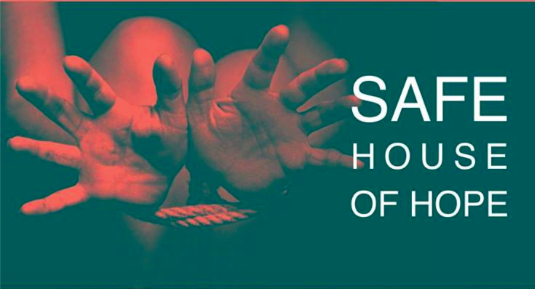You never think it’ll happen to you, or even anyone like you. Sex trafficking is an issue many of us have been able to distance ourselves from simply because it is a problem that we think is far away. We think that sex trafficking happens in developing countries to girls that we have nothing in common with, but the documentary “In Plain Sight” tells a different story.
On March 22, Loyola’s chapter of the Public Relations Student Society of America (PRSSA) and the Women’s Center partnered to host a screening of the film with a discussion to follow. All proceeds went to Safe House of Hope, a facility in South Baltimore that caters to former and current sex trafficking victims, which was heavily damaged in a fire in November of last year.
PRSSA Vice President Kelly Bruchard ’17 shared a little bit about how the event came to be. “[Our faculty advisor Tania Rosas-Moreno, Ph.D.] brought the Safe House of Hope fire to [PRSSA President] Danielle’s and my attention last semester, and since we are always trying to better the Baltimore and Loyola community we knew we wanted to do something to help out,” Bruchard said.
“SHOH is one of the very few resources these women have to turn to in Baltimore City, so we knew the fire was a setback and they could use all the support and assistances they could get.”
The event began with an invocation by Rev. Timothy Brown, S.J.. Brown focused on the community of kinship and hope that is fostered at Loyola, and how anger of what cannot be fuels the courage to pursue what should and shall be.
According to “In Plain Sight,” approximately 100,000 children and even more women become victims of sex trafficking. Within this demographic, 80 percent of these people are U.S. citizens and are between 12 and 14 years of age. Pimps play on the vulnerability that these girls and women exhibit, and subject them to force, fraud, and coercion.
The hour-long documentary features various cities around the country that suffer high rates of sex trafficking, an issue which many of their residents are usually unaware of. Among these cities include Houston, Dallas, Sacramento, Nashville, and even our very own Baltimore. Luckily, these metropolitan areas also have rehabilitation centers and homes for its high volume of victims.
These establishments were built by women who were deeply disturbed by the reality of sex trafficking in our country, or even victims of sex trafficking themselves, who felt that they could not stand by without taking action to help these girls and women.
As a result, the main focus of many of these places is to give girls the childhood that they were robbed of, provide them with channels of creativity like cooking and art, and create a nurturing and support space in which they are allowed to recuperate from their trauma.
The screening was followed by a discussion panel led by Safe House of Hope founder Denene Yates, spokesperson Ryan Servant, Meghan Ross of The Samaritan Woman, and a sex trafficking survivor, Stephanie.
As made clear by Servant, trafficking is in part a cultural issue that is inflamed by the increased consumption of pornography as well as the language we use to talk about women. In part, these are practices automatically assumed to be engaged in by men, but the participation of women has also demonstrated the changing market.
But Stephanie’s story also confirmed that being a victim of sex trafficking does not define you, and that there is life after being released from its bonds. Now a few years removed from her experience, Stephanie has been able to live a life for herself and is excited for what the future holds.
Being able to hear the story of an actual local survivor left a lasting impact on the audience.
“I was blown away by Stephanie’s story, and I am so grateful that she shared it. Hearing her speak after watching [the documentary] just made it more clear that sex trafficking is a real problem in America, in Baltimore, and that we have a duty to help those who have been affected by it,” Angela DeCarlo ’19 said.
The choice to screen “In Plain Sight” was a deliberate one, especially because of the documentary’s emphasis on Baltimore.
“We thought it would evoke more emotion and response from the audience to show them that this issue literally happens right down the road from Loyola, not half way across the world like most people think” Bruchard said.
And the documentary did just that. Many students from the audience eagerly asked questions about what they could do as Baltimore citizens to help women and girls being trafficked in their own community. Yates emphasized the importance of inclusivity, even if it is just asking that person if they want to go to the movies, to give them a sense of normalcy and provide them with companionship.
The event even jolted some students to actively join the fight against sex trafficking.
“After the screening, I was in complete shock that human trafficking occurred in the United States: the land of the free. After hearing the stories of women who were able to overcome, I became inspired and determined to fight against this terrible crime. The work done at Samaritan Woman has inspired me to become more educated and more involved through volunteering and internships,” Elisabeth Freer ’19 said.
With events like this, Loyola continues to foster care for a community that goes well past the walls of its campus. As members of the Baltimore community, a duty is instilled within us to act as caretakers and defenders of our brothers and sisters, one person at a time.
















































































































